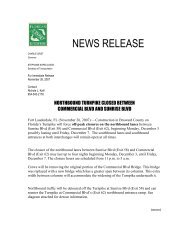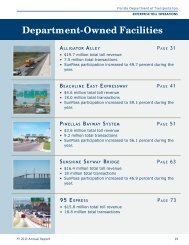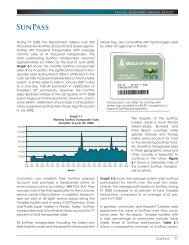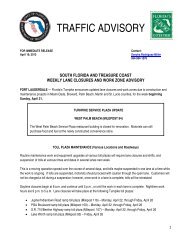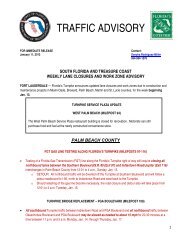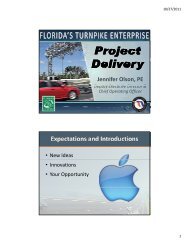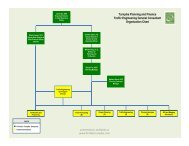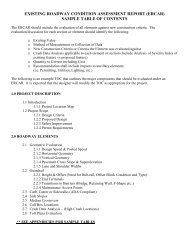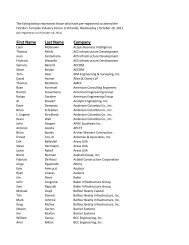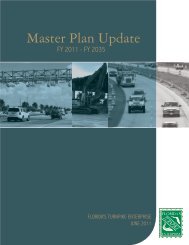EMERGENCY RESPONDER TOLL PLAN - Florida's Turnpike
EMERGENCY RESPONDER TOLL PLAN - Florida's Turnpike
EMERGENCY RESPONDER TOLL PLAN - Florida's Turnpike
Create successful ePaper yourself
Turn your PDF publications into a flip-book with our unique Google optimized e-Paper software.
Approved: Effective: July 6, 2011<br />
Office: Emergency Management<br />
Topic No.: 956-010-001-a<br />
________________________<br />
Department of Transportation<br />
PURPOSE:<br />
<strong>EMERGENCY</strong> <strong>RESPONDER</strong> <strong>TOLL</strong> <strong>PLAN</strong><br />
This Emergency Responder Toll Plan (“Plan”) establishes the emergency responder toll plan<br />
procedure for the Florida Department of Transportation, Florida’s <strong>Turnpike</strong> Enterprise<br />
(“<strong>Turnpike</strong>”) that delineates certain roles, responsibilities and authorities. If a natural or<br />
manmade disaster should occur in the State of Florida, easy access must be provided to all<br />
affected areas. All emergency responders must pay tolls to access the Florida toll roads<br />
except as exempted pursuant to Section 338.155 (1), Florida Statutes (F.S.), as set forth<br />
below. Due to technological advances in toll collection, paying and keeping track of tolls can be<br />
accomplished efficiently.<br />
Section 338.155 (1), Florida Statutes, states in relevant part:<br />
“…No persons are permitted to use any toll facility without payment<br />
of tolls, except employees of the agency operating the toll project when<br />
using the toll facility on official state business, state military personnel<br />
while on official military business, handicapped persons as provided in<br />
this section, persons exempt from toll payment by the authorizing<br />
resolution for bonds issued to finance the facility, and persons exempt<br />
on a temporary basis where use of such toll facility is required as a<br />
detour route. Any person operating a fire vehicle when on official<br />
business or a rescue vehicle when on official business is exempt from<br />
toll payment. Any person participating in the funeral procession of a<br />
law enforcement officer or firefighter killed in the line of duty is exempt<br />
from toll payment. The secretary, or the secretary's designee, may<br />
suspend the payment of tolls on a toll facility when necessary to assist<br />
in emergency evacuation. The failure to pay a prescribed toll constitutes<br />
a noncriminal traffic infraction, punishable as a moving violation<br />
pursuant to Section 318.18, F.S. The department is authorized to adopt<br />
rules relating to guaranteed toll accounts…”<br />
STATUTORY AUTHORITY FOR IMPLEMENTATION:<br />
Section 20.23(4)(a), F.S., and Section 334.048(3), F.S.
OTHER STATUTORY REFERENCES AND APPLICABLE ORDERS:<br />
Section 316.1001, F.S., and Section 338.155, F.S.<br />
Chapter 252, F.S.<br />
Governor’s Executive Orders or proclamations declaring a State of Emergency<br />
SCOPE:<br />
956-010-001-a<br />
Page 2 of 5<br />
This Plan applies to all emergency responders within the State of Florida subject to applicable<br />
law.<br />
BACKGROUND:<br />
Historically, tolls have been temporarily suspended in accordance with Section 338.155 (1),<br />
F.S., to facilitate emergency response efforts that include the evacuation of citizens from areas<br />
likely to be impacted by significant natural or man-made disasters. Once the evacuations were<br />
ceased, tolls were reinstated. All vehicles, unless specifically exempted by Section 338.155<br />
(1), F.S., were then required to pay tolls. However, emergency response efforts continued to<br />
be conducted despite the active evacuation and temporary toll suspensions being lifted. In<br />
order to assist those efforts, tolls were waived for emergency responders. This would lead to a<br />
loss of revenue for the Department, which the Federal Emergency Management Agency<br />
(FEMA) deemed to be ineligible for reimbursement.<br />
DEFINITIONS:<br />
Emergency Responder: Any federal, state, or local government employee (in-state or out of<br />
state), or representative of a private or non-profit entity who is tasked with responding to<br />
emergencies.<br />
Federal Emergency Management Agency (“FEMA”): FEMA’s mission is to reduce the loss<br />
of life and property and protect the nation from all hazards, including natural disasters, acts of<br />
terrorism, and other man-made disaster, by leading and supporting the nation in a risk based,<br />
comprehensive emergency management system of preparedness, protection, response,<br />
recovery, and mitigation.<br />
Florida Division of Emergency Management (“FDEM”): FDEM manages the overall<br />
response and recovery efforts to natural and technological disasters in Florida.<br />
Incident Command System (“ICS”): ICS is a common framework within which (<strong>Turnpike</strong><br />
employees) work together effectively across the five major functional areas: Command,<br />
Operations, Planning Logistics, and Finance and Administration. ICS is based upon a flexible,<br />
scalable response.
956-010-001-a<br />
Page 3 of 5<br />
State Emergency Operations Center (“SEOC”): SEOC is the State level designated location<br />
where emergencies are managed.<br />
State Emergency Response Team (“SERT”): SERT is a collective group of eighteen (18)<br />
Emergency Support Functions (“ESF”) at the SEOC under the management of the State<br />
Emergency Coordination Officer. The lead agency represents each ESF as part of the SERT.<br />
SunPass ® Mini Transponder: The SunPass ® Mini Transponder is a decal-type transponder<br />
that is mounted to the windshield, usually just behind the rear-view mirror. Once it is mounted,<br />
it cannot be removed from the vehicle and reused.<br />
SunPass ® Portable Transponder: The SunPass ® Portable Transponder is mounted to the<br />
windshield just, usually behind the rear-view mirror. Because it uses suction cups to attach to<br />
the windshield, it can be removed and transferred to another vehicle for continued use.<br />
SunPass ® Emergency Response Team: The Sunpass ® Emergency Response Team is a<br />
team of certain <strong>Turnpike</strong> designated employees assisting in the distribution and procurement<br />
of SunPass ® Transponders in the event the normal supply chain is inadequate. The team will<br />
consist of <strong>Turnpike</strong> personnel. The field locations are dependent on the need as established<br />
by <strong>Turnpike</strong>. The <strong>Turnpike</strong> designated field teams will handle distribution of SunPass ®<br />
Transponders after purchase of same and will provide activation assistance for the SunPass ®<br />
Transponders.<br />
Transponders: For purposes of this Plan, SunPass ® Mini Transponder and SunPass ®<br />
Portable Transponder shall collectively be referred to herein, as “Transponder” or<br />
“Transponders” as the context may require.<br />
1. <strong>TOLL</strong> PAYMENT OPERATIONS<br />
To facilitate a safe and timely response to major natural or man-made disasters by emergency<br />
response personnel and agencies, the <strong>Turnpike</strong> has developed multiple methods for toll<br />
collection to ensure tolls are paid in an efficient manner on Florida’s toll roads and bridges.<br />
This plan will allow emergency responders full access to survivors and critical infrastructure in<br />
the affected areas, without sacrificing much needed revenue. Because the tolls are paid by<br />
emergency responders who are officially tasked by SERT in response to a federally declared<br />
disaster, applications for reimbursement can be submitted to FEMA through the Public<br />
Assistance Program. This significantly reduces the financial impact to the Department and<br />
allows the emergency responders to recover all, or at least the majority, of the costs<br />
associated with responding to the disaster.<br />
The primary method for toll collection is through the use of a Transponder. Users of<br />
Transponders activate a SunPass ® pre-paid account in order to make automatic payments for<br />
use of toll roads. SunPass ® Transponders can be purchased at locations statewide as set<br />
forth in Section 1.1 below.
1.1 SUNPASS ® PURCHASE LOCATIONS<br />
956-010-001-a<br />
Page 4 of 5<br />
Transponders may be purchased at certain retailers as identified on the SunPass ® Website at<br />
http://www.sunpass.com. Transponders can also be purchased at http://www.sunpass.com.<br />
Transponders purchased and registered online will be mailed to the purchaser and available<br />
for use upon receipt.<br />
1.2 SUNPASS ® ACCOUNT ACTIVATION<br />
After purchasing a Transponder from a retailer as mentioned above, prior to use and activation<br />
of the Transponder, the customer is required to register their Transponder with <strong>Turnpike</strong> as<br />
follows: Contact SunPass ® Service Center at 1-888-<strong>TOLL</strong>-FLA (865-5352); visit the SunPass ®<br />
Website at http://www.sunpass.com; or visit a SunPass ® Service Center such as in Boca<br />
Raton and Snapper Creek.<br />
1.3 SUNPASS ® ACCOUNT VERIFICATION<br />
SunPass ® Account status can be verified by visiting http://www.sunpass.com, where the<br />
account balances, updated account information, and replenishment(s) are available. <strong>Turnpike</strong><br />
representatives will need the SunPass ® account number or SunPass ® Transponder number<br />
and the customer’s PIN, which are determined when the prepaid SunPass ® account is<br />
activated.<br />
2. <strong>EMERGENCY</strong> OPERATIONS<br />
In the event a unique storm or event takes place that prevents the procurement of<br />
Transponders through the normal procurement methods outlined above, <strong>Turnpike</strong> has<br />
developed several contingency plans for purchase as set forth below.<br />
2.1 EXPEDITED ACQUISITION<br />
With advance notice, <strong>Turnpike</strong> will make available a number of Transponders to emergency<br />
responders that can be purchased and quickly activated to allow emergency responders<br />
access to all toll roads. If multiple Transponders are required, <strong>Turnpike</strong> may create a<br />
commercial account and overnight the shipment to the appropriate address.<br />
2.2 SUNPASS ® <strong>EMERGENCY</strong> RESPONSE TEAMS<br />
<strong>Turnpike</strong> will deploy a SunPass Emergency Response Team to staff remote off-site locations<br />
and provide necessary resources for emergency responders to be able to purchase<br />
Transponders for travel on Florida’s toll roads more efficiently. Transponders purchased at the
956-010-001-a<br />
Page 5 of 5<br />
remote SunPass ® Emergency Response Team staffed locations can be activated at such<br />
sites.<br />
3. RECOMMENDED USE OF TRANSPONDER TYPES<br />
3.1 RENTAL VEHICLES<br />
It is recommended that emergency responders using rental vehicles purchase SunPass ®<br />
Portable Transponders. The SunPass ® Portable Transponder can be placed in the rental<br />
vehicle for tolling with no charge to the car rental company. Upon completion of the<br />
emergency response, the emergency responder is responsible for immediately removing the<br />
Transponder from the rental vehicle. In the case of the SunPass ® Mini Transponder, the<br />
emergency responder is responsible for immediately destroying the SunPass ® Mini<br />
Transponder upon completion of the emergency response. Any Transponders left in rental<br />
vehicles after the completion of the emergency response are the responsibility of the<br />
emergency responder. <strong>Turnpike</strong> bears no responsibility or liability for any negative<br />
consequences resulting from any Transponder left in a vehicle after completion of a<br />
emergency response including, without limitation, any tolls incurred.<br />
3.2 PERSONAL VEHICLES<br />
It is recommended that emergency responders using personal vehicles purchase SunPass ®<br />
Mini Transponders.<br />
3.3 AGENCY, COUNTY, OR COMPANY VEHICLES<br />
It is recommended that emergency responders using agency, county or company vehicles<br />
purchase SunPass ® Mini Transponders.<br />
4. POST EVENT RESPONSIBILITIES<br />
After the emergency response, it is the emergency responder’s responsibility to deactivate the<br />
SunPass ® account(s) and remove the Transponder from the subject vehicle windshield.<br />
5. TRAINING<br />
None Required.<br />
6. FORMS<br />
None required.



